Organic Search Ranking Guide 2021- Three Strategies for SEO
What is Organic Search Ranking?
Your organic search ranking is how high your website ranks on search engine results pages (SERPs). For example, if you ranked #16 for ‘marketing agency’, you’d come up about midway through the second page of search results on Google.
In order to improve your ranking you would need to practice search engine optimization, or SEO for short. What strategies increase your rank best are always changing, however there are three things we know will affect your ranking more than others. Those strategies are:
- Create quality content targeted at industry specific long-tail keywords
- Increase relevant backlinks
- Fix your technical SEO
In order to have some perspective on whether your efforts have been effective or not, I recommend searching up your current ranking on Google’s search console so you can compare if what you’ve done has had any effect.
Once you’ve set up your account and confirmed the web address is yours, Google will show you what keywords your website is ranking for.
You can find your ranking by clicking on performance, then clicking on your average ranking, then scrolling to the bottom of the page. This is very useful for tracking how you’re doing, and you should take weekly screenshots so you can see how things have changed.
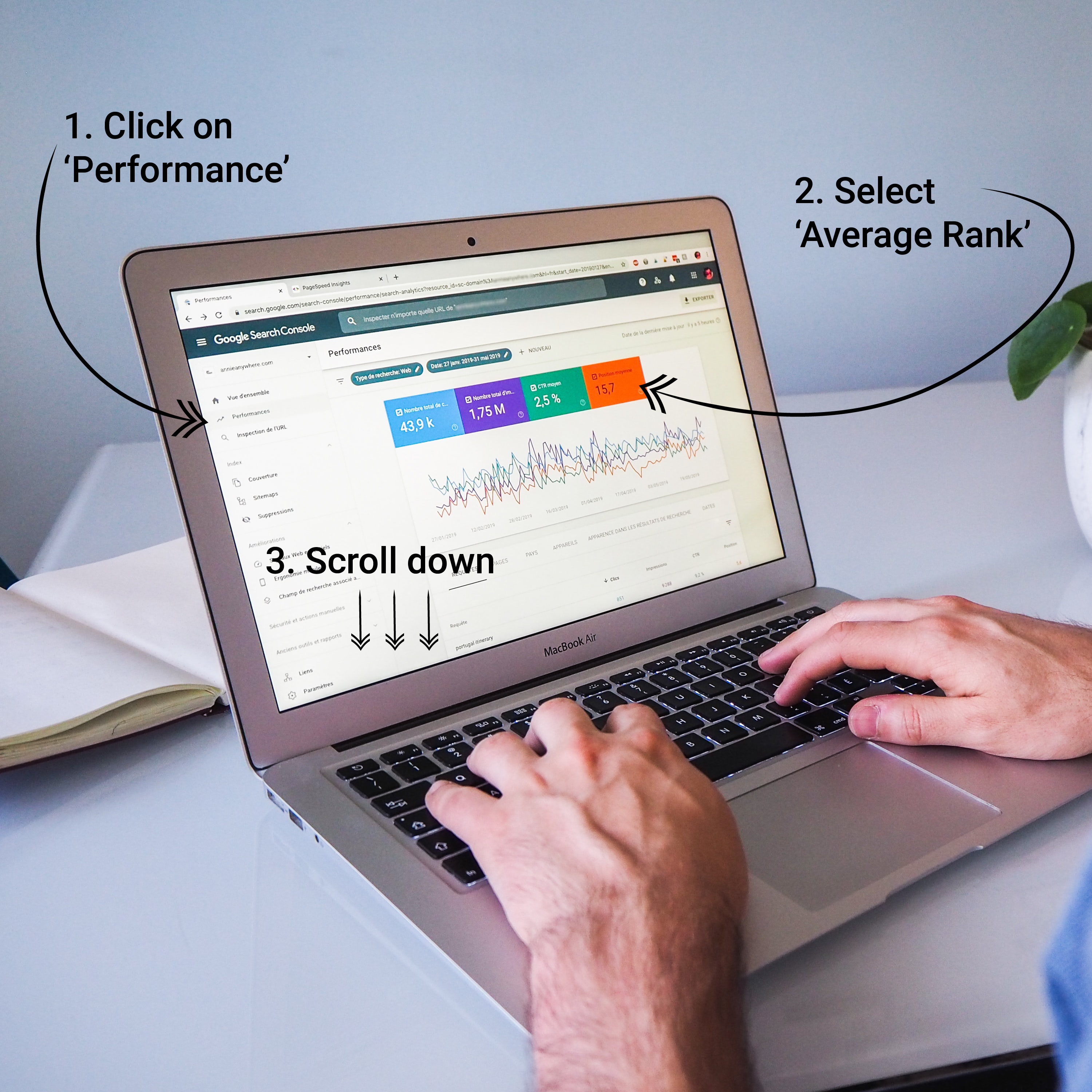
Be careful with how deeply you read into the changes- Google changes the ranking algorithm frequently, with over 3000 known updates in 2018, so if any changes happen it could just be because of a shift in Google’s ranking algorithm rather than something you did. As they say, correlation is not causation.
Strategy 1: Content for long-tail keywords
Now you know what keywords you’re currently ranking for with Google’s search console, you can write more content targeting those words and phrases to enable yourself to rank higher for those keywords.
Preferably, however, search out long-tail keywords with a high search volume and low competition to target content at, regardless if you’re currently ranking for them or not. If it’s relevant to your field, you should be creating content for it.

Though you can write content for short-tail keywords which generally have a high amount of searches, there will be a lot of competition for these and it’s not likely you will be able to rank for them without already having a lot of backlinks to your site (we’ll get to that later).
Long tail keywords will get less search traffic, though you are more likely to rank for these as there is likely going to be less competition for them. Instead of just writing a piece of content saying ‘Best UK Marketing Agency’, you could write something like “The Best Marketing Agencies for SEO in Portsmouth North Harbour”.
There will be a lot less traffic for that term, but if there is no, or limited content answering that query it is an easier way to rank higher.

Google loves it when content includes everything there is to know about a topic, such as an ‘Ultimate Guide’, so ideally your content should be long-form at around 700-2000 words. You’re more likely to gain backlinks if your content targeting the specific search query is the best available - being clear and comprehensive.
This will help your overall SEO efforts, and then once you have a good amount of traffic coming in you can try to target those shorter-tail keywords and get access to a larger audience.
How to find keywords
There are some great sites out there which will be able to identify potential keywords you can use. If you write a keyword close to what your customers will be searching and put that into a site like Ubersuggest, it will give you some free suggestions on similar keywords which are being searched and how difficult it will be to rank for them.
A way to find up-and-coming keywords is to use the Reddit Keyword Research Tool, which will crawl through a Reddit forum and find popular keywords with their own average monthly searches.
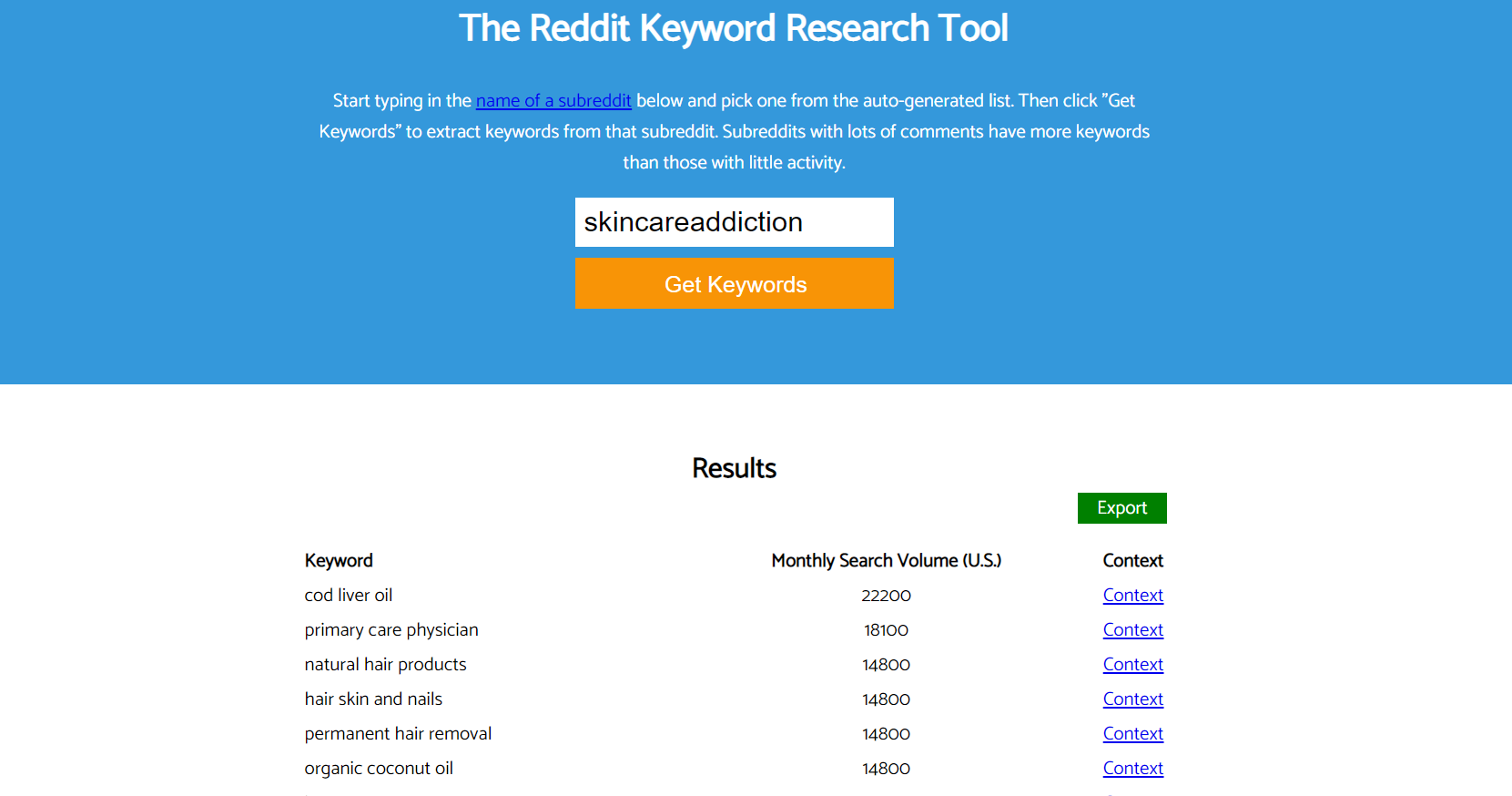
This will get you different results from most other tools, however it’s a great way to find out what’s gaining popularity and will be searched soon on wider reaching platforms, so you’re able to get ahead of your competition to rank for these keywords.
Google’s keyword planner is a good site to go to if you want to run a PPC campaign, as it estimates how much you’ll likely need to pay to get a PPC search ad for a keyword, however it also provides some useful information for SEO. It can find how competitive a keyword is and how many monthly searches it has on average, key metrics to assess how worthwhile it will be to write content for that keyword .
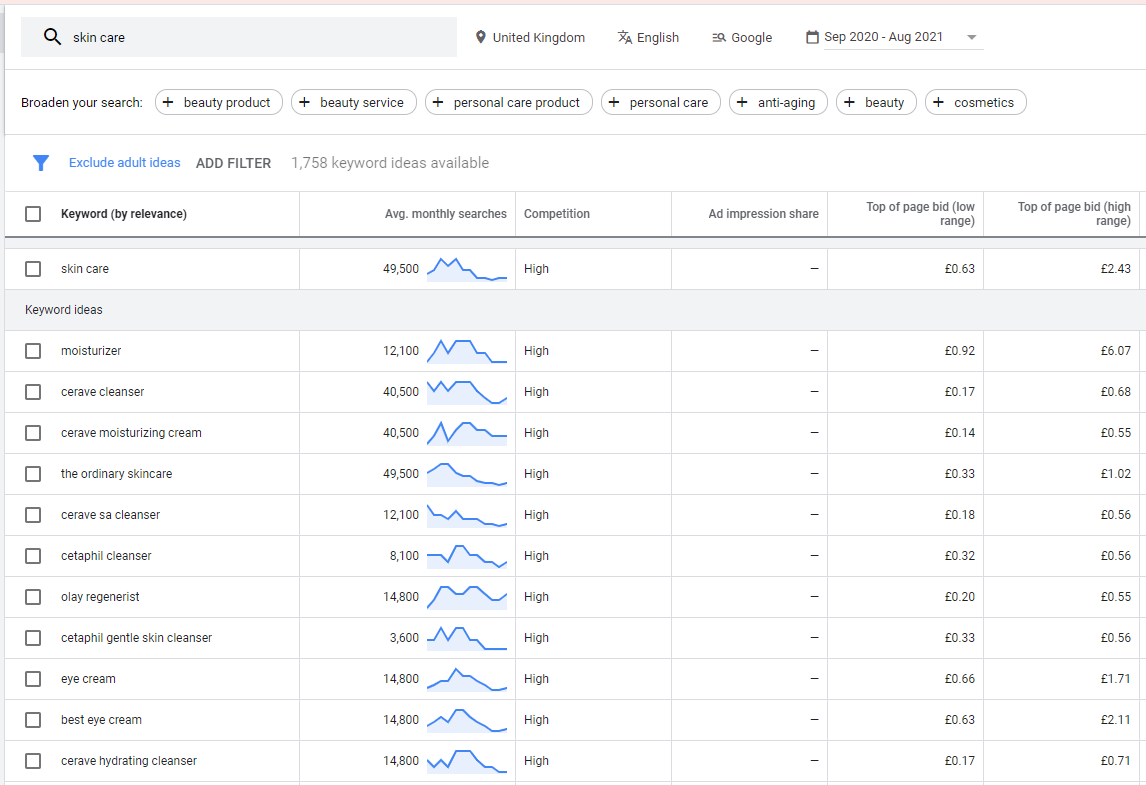
As you can see, it gets you very different results from the Reddit tool, and both can be used in keyword research - for example, you may want to get ideas from Reddit and see how much competition there is for that word with Google’s keyword planner.
Google Trends is a good place to go for keywords if you can write quickly, as you’ll be able to take advantage of keyword trends- this also applies to Twitter's trending page. Speed is key here, though, so this isn’t a good strategy to rely on.
If you have content related to the trend already though, this would be a great time to tweet it with the relevant hashtag.
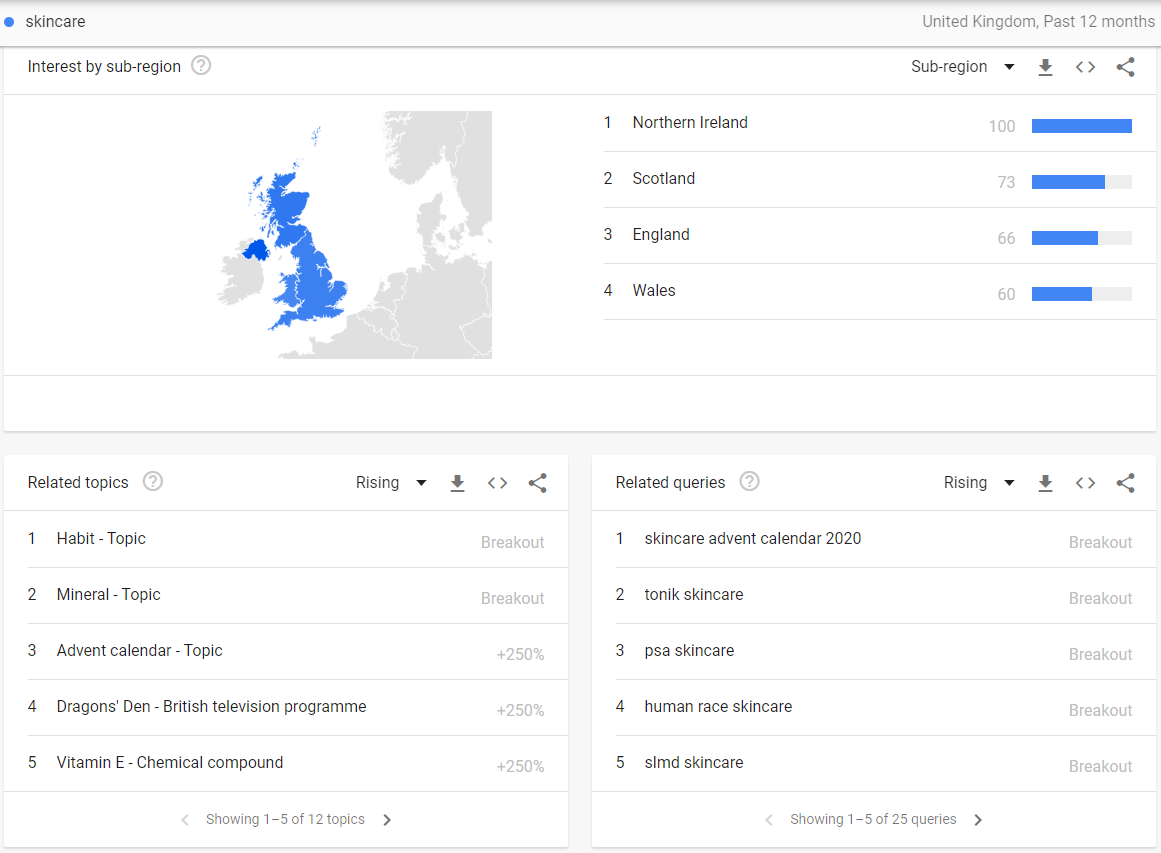
From here, you can click on related queries and really go down a rabbit hole of trending searches.
How to identify what keywords to use
There are 5 concepts to consider when you narrow down which keywords you should target. These are:
- Search demand
- How many people are searching for this? Is it likely this search will generate enough clicks to be worth your time writing?
- Traffic potential
- Does the traffic that will be generated from this search query match the business’s target audience?
- Business potential
- Will ranking for this query benefit my business?
- Match search intent
- Do you match search intent? E.g. If someone is searching how to cook lasagna, they’d want a recipe, not an article listing the best lasagna dishes on a budget.
- Ranking difficulty
- What's the competition for this keyword like? Can you create better content than what’s available and have enough backlinks to rank for the query?
When you’ve fully assessed your keyword options you can now begin creating content for them. As mentioned earlier, this should be long form and comprehensive. Another thing to note is to include pictures as visual content means readers are more likely to be engaged.
Strategy 2: Gain backlinks from reputable sites
This strategy refers to your off-page SEO and has a huge effect on a webpage’s ranking. Backlinks are hyperlinks pointing to your site from other webpages. In fact, Google themselves confirmed content and backlinks were the two highest ranking factors.
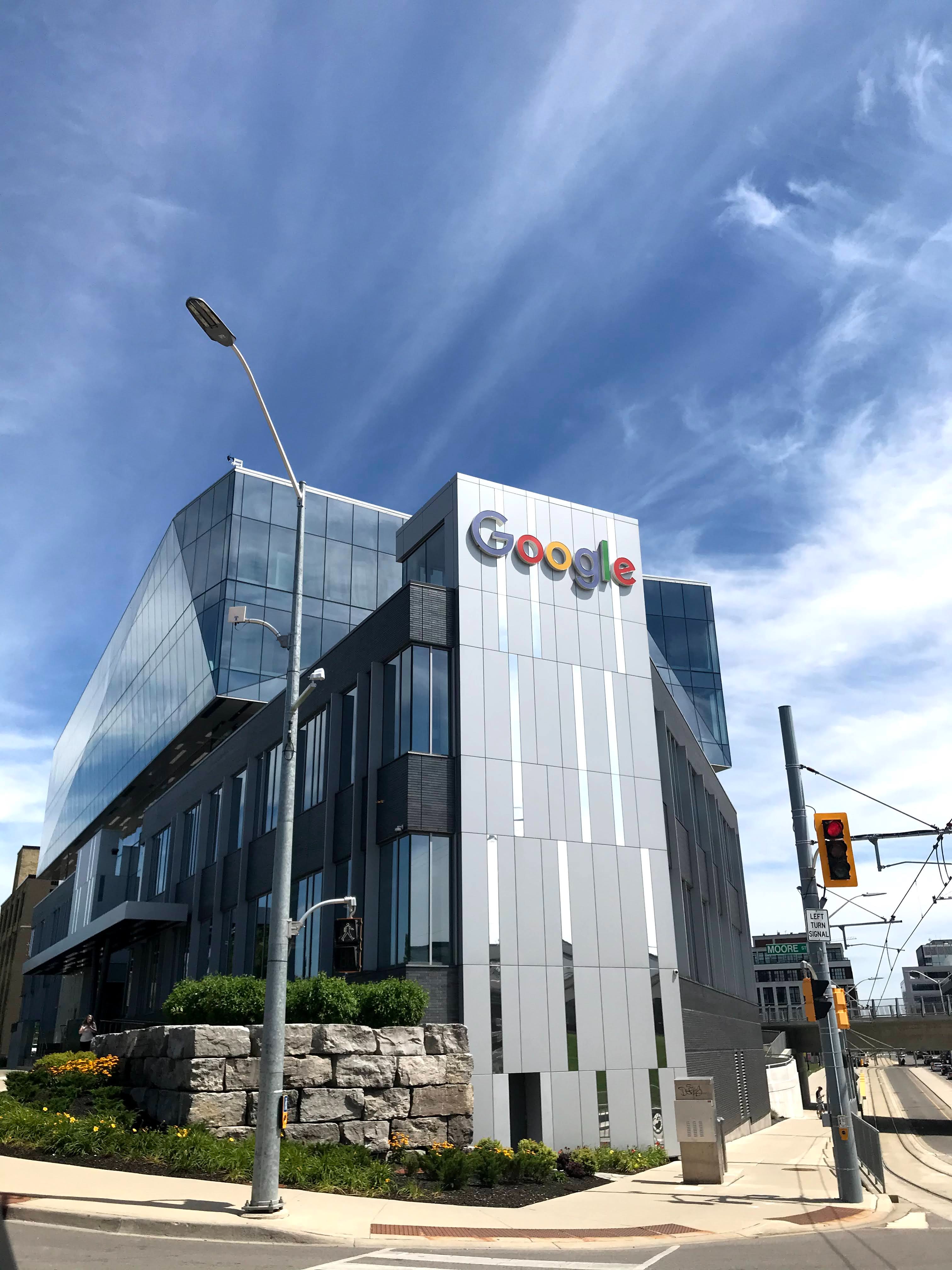
You can check who is linking to your page for free on this backlink checker which offers you three daily searches on their free plan, so you can also see where your competitors are getting their backlinks from, and potentially reach out to these pages and write guest blogs for them in exchange for a backlink to your site.
You can also pay for a backlink but we don’t recommend it as if Google found out, it could severely damage your SEO for months as it goes against Google's terms of service.
How to gain backlinks
There are plenty of ways to get backlinks, however the quality of the links and the time needed to get them vary across each strategy.
Guest blogs
To find guest blogs you could do a Google search in quotation marks- this will make sure google will only bring up results which match your exact phrase. Examples include “guest post”, “write for us”, “become a contributor”, “suggest an article”, and variations of those terms.
Advantages
- Can choose what sites you want to target
- You create the idea for the article yourself
- Send out guest post requests any time you want
Disadvantages
- Very competitive
- Will take time to find sites you can write content for that will be relevant to their site and yours
- Have to write a long-form article
- Sites looking for guest articles are less highly to have a high ranking on Google as they’re generally small sites
News article and Podcast contributions
HARO (Help a Reporter Out) is an online tool connecting journalists with contacts who are experts in their field. Three different times a day you’ll receive about 40 requests, so about 120 in a day.

The reporters want sources to quote for their articles, and with over a hundred requests a day it’s very likely there will be something out there you have the right expertise to reply to. Replies are capped at a 300 word limit, so journalists can’t ask you to write their whole article for them.
Advantages
- These are people searching for you- you aren’t searching for them, so they’re more likely to give you a good backlink
- Many very reputable sites request sources here such as Forbes and Business Insider
- Regular posts asking for sources (about 120 a day)
- The basic plan is free
Disadvantages
- Much of the time, people won’t respond to you
- You have to reply quickly as its very competitive
- You have to pay to see the requests first- and where speed matters so much, if you don’t have the pro plan it could be difficult to even be considered
Write ‘Skyscraper’ content
We mentioned you can also get backlinks from writing content, and you certainly can!

By making fully comprehensive content like a ‘guide’ which targets those long-tail keywords I spoke about earlier, you’re more likely to be seen as an authoritative source by Google. You will also be ranked higher as you’re mentioning lots of things relevant to your industry.
If you have the best piece of content out there, it's also likely you’ll get organic backlinks from others in your field when they write their own bits of content and need to reference someone so their readers can find out more information. This helps with SEO and you might even get a few clients and/or customers out of it!
Other tactics
A lot of people will suggest posting or commenting on forums like Reddit, Quora and Medium. This used to be a great tactic though now these are now considered ‘nofollow’ links, and won’t contribute to your ranking on the SERP.
Some articles may also suggest finding broken backlinks on other pages and making the website owner aware, then suggest they use your content instead. This can work though is also very time consuming and purely luck-based if it works.
Strategy 3: Check your technical SEO
We have two great articles which go into more detail about how you can both check your technical ranking’s current state, and how to fix the technical SEO.
In brief, however, you need a page which loads quickly, can be ‘crawled’ (data can be collected easily) by Google and is mobile friendly in terms of the user experience and avoiding any cumulative layout shift.
Summary
Your organic search ranking matters because it has long term benefits, unlike expensive to run PPC.
You can think of SEO as more of an asset you’re building which will reap long term rewards, and if it’s done correctly you may not need to spend any money on PPC to bring in business.
If you’d like more information on how well your site is optimised for SEO, contact us for a free website review.
